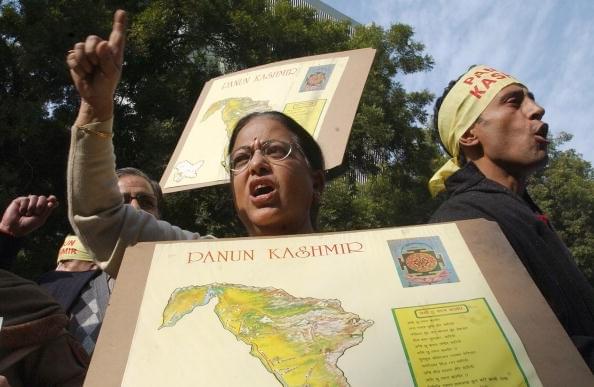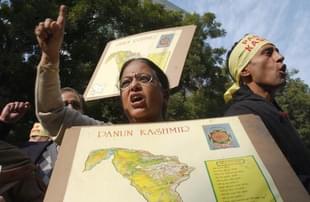Politics
Is 100-Acre Land Enough To Rehabilitate The Exiled Hindus Of Kashmir?
Hari Om Mahajan
Jan 27, 2017, 12:36 PM | Updated 12:36 PM IST
Save & read from anywhere!
Bookmark stories for easy access on any device or the Swarajya app.


On 19 January, two very significant developments took place, both in Jammu, and both related to Kashmiri Hindus, who on this day in 1990 quit their land of Vitasta (Jhelum) to save their lives, culture, dignity and religion, and became refugees in their own country. They left behind their houses, business establishments, orchards, agricultural tracts, ancient temples, shrines and what not. (Their exodus was a blot on the Indian state.)
That day, the Jammu & Kashmir Legislative Assembly sprung a big surprise by adopting unanimously a resolution seeking the creation of a congenial atmosphere that could induce the internally-displaced Kashmiri Hindus to return to their original habitat. Interestingly, the resolution was moved by Leader of Opposition and former Jammu & Kashmir Chief Minister Omar Abdullah (Daily Excelsior, 20 January). It is a different story that none in the assembly questioned his indifferent, nay hostile, attitude to the issue of great national and human import despite being the Chief Minister for a full six-year term. His father, Farooq Abdullah, was the Chief Minister, and Chief Minister Mehbooba Mufti’s father, late Mufti Mohammad Sayeed, was the Union home minister when Hindus quit the Kashmir Valley. They had been confronted with a choice between death, conversion and migration. It was for the first time in 27 years that such a resolution was adopted by the state legislature.
The same day, Panun Kashmir (‘My Kashmir’), a frontline organisation of the internally-displaced Kashmiri Hindus, adopted two resolutions at the jam-packed Abhinav theatre in Jammu. The resolutions urged the Union government to declare 19 January as “National Holocaust Day” and create a separate “homeland in Kashmir North-East of River Jhelum invested with Union Territory status where Indian Constitution flows freely”.
This writer was present at the venue of national convention on the Kashmiri Hindu issue, and over 100 leaders of Hindu organisations from West Bengal, Odisha, Tamil Nadu, Maharashtra, Madhya Pradesh, Rajasthan, Karnataka and Kerala participated, offering their full support to the Kashmiri Hindu cause. Indeed, it was a memorable scene, coupled with emotions and heart-rending tales of how Kashmiri Hindus were disgraced, humiliated, tortured and butchered.
The Panun Kashmir resolution on the separate homeland read:
On this day, we once again reiterate that the internal displacement of the entire population of Hindus of Kashmir in 1989-90 was the result of a planned religious cleansing campaign. This campaign was a campaign of genocide and nothing else. The perpetrators and collaborators of this genocide are still roaming free (read Syed Ali Shah Geelani and Co). The governments of the day in the state (in this case Farooq Abdullah’s Government) and at the Centre (read late VP Singh’s Government) did not only behave as bystanders when the genocide started but actually collaborated in its denial. We are conscious of the grim historical reality that Hindus in India are face to face with a thousand-year-long war. This war destroyed Hindus from Afghanistan to the boundaries of present day India. Reversal of genocide of Hindus in Kashmir is, in fact, a resolve to put a halt to this genocidal war. It is a resolve to prevent its recurrence in any other part of India. Creation of Union Territory North and East of River Jhelum for the settlement of all Hindus belonging to Kashmir is the only way of reversing this genocide. We declare that creation of Panun Kashmir in Kashmir has become a national as well as global imperative to defeat jihad in Jammu & Kashmir. We resolve to make the creation of this Union Territory in Kashmir a national campaign so that people of India prevail upon the Government of India to ensure its proper creation.Daily Excelsior (20 January)
A day earlier, the Panun Kashmir had organised a massive rally at Jagti, Jammu, which houses thousands of internally-displaced Kashmiri Hindus. (Jagti is described as a “camp of hard-core nationalists.”) It was a massive, heart-wrenching show. The participation of the suffering Hindu women and children was on an unprecedented scale. It was perhaps the biggest ever rally organised by any Hindu organisation in Jammu to champion the cause of the Kashmiri Hindu refugees. The adoption of the resolution by the Jammu & Kashmir Assembly on the Kashmiri Hindus’ return could be legitimately attributed to this Jagti event.
It was hoped that the Jammu & Kashmir legislature would appreciate their concerns and fear, and do something substantial to motivate or induce the Hindu refugees to go back to their homes and hearths, but, sadly, nothing of this sort happened. Instead, the Jammu & Kashmir government on 24 January made an announcement that it had identified 100 acres of land at eight places in Kashmir’s 10 districts for their rehabilitation (State Times, 24 January).
The declaration came after the central government’s recent approval for the construction of 6,000 transit accommodations in the Kashmir Valley for Kashmiri Hindu refugees.
The Minister of Relief, Rehabilitation and Reconstruction, Basharat Ahmad Bukhari, announced in the Legislative Assembly,
The Government of India has conveyed the approval for the construction of transit accommodations in the Kashmir Valley for allotment to Kashmiri migrants to whom state government jobs have been provided or will be provided. In this regard, the Deputy Commissioners of the Kashmir Valley have identified 723.03 kanals with the tentative cost of land being Rs 374.65 crore.The Tribune (24 January)
As expected, the Panun Kashmir leaders rejected outright the official declaration and said that the Jammu & Kashmir government only rubbed salt on the wound of Kashmiri Hindus.
“We are the original inhabitants of Kashmir. Kashmir belongs to us. We represent the nation in Kashmir. We will not return to Kashmir to live in ghettos. We will not return to our original homes because we can’t co-exist with those who expelled us,” said Agnishekhar while reacting to the official announcement. In addition, he said that the “homeland with Kashmir North and East of River Jhelum is our motto and we will not deviate from our path”.
Another Kashmiri Hindu leader of high standing, Ajay Chrungoo, also expressed almost identical views. He said, “The Government’s announcement has only rubbed salt on the Hindu wound. Only three days ago, Kashmiri Hindus in their thousands at Jagti and Abhinav Theatre reiterated their resolve on homeland. We will go back to Kashmir the day our main demand of separate homeland is accepted.” (Early Times, 26 January)
Earlier on 19 January, the Panun Kashmir had rejected the assembly resolution saying that those who caused their exodus had passed the resolution only to hoodwink the Kashmiri Hindus and mislead the international community. The group’s leaders had said,
It is strange that those who created a situation that forced our community to quit Kashmir are today passing a resolution on the need to create conducive atmosphere so that the Hindus could return to Kashmir. They are just hypocrites. They opposed even the creation of a Pandit colony in Kashmir, saying their return would change the Kashmir’s demography. We reject outright their attempt to mislead and hoodwink the national and international opinion by passing a mischievous resolution.
In addition, the Panun Kashmir leaders Agnishekhar and Chrungoo said,
We are not migrants. We didn’t come to Jammu and went to other places in the country in 1990 on our own to obtain jobs. We were forced to quit our homes as we were committed Indians and committed Hindus and as we rejected the separatists’ diktats that they should join anti-India movement and work for the Kashmir’s separation from India. We were called Kafirs. We were called fifth columnists. All kinds of invectives were used against us. Many Hindus were murdered in cold-blood. Our women folk were humiliated. We are refugees living in Jammu and several other places and we will return to Kashmir on our own terms and conditions.Early Times (21 January)
One just can’t ignore what the Panun Kashmir leaders have said considering the fact that Kashmir is now 100 per cent Muslim, and radicalised. The powers-that-be in Jammu & Kashmir and at the centre would do well to take cognisance of their aspirations, fears and compulsions so that they return to Kashmir they miss very much. Remember, Kashmir was 100 per cent Hindu till 1339, when Shah Mir usurped the land of Kasyap Rishi through deceit, oppression and persecution.
Hari Om Mahajan is former Dean, Faculty of Social Sciences, University of Jammu.





